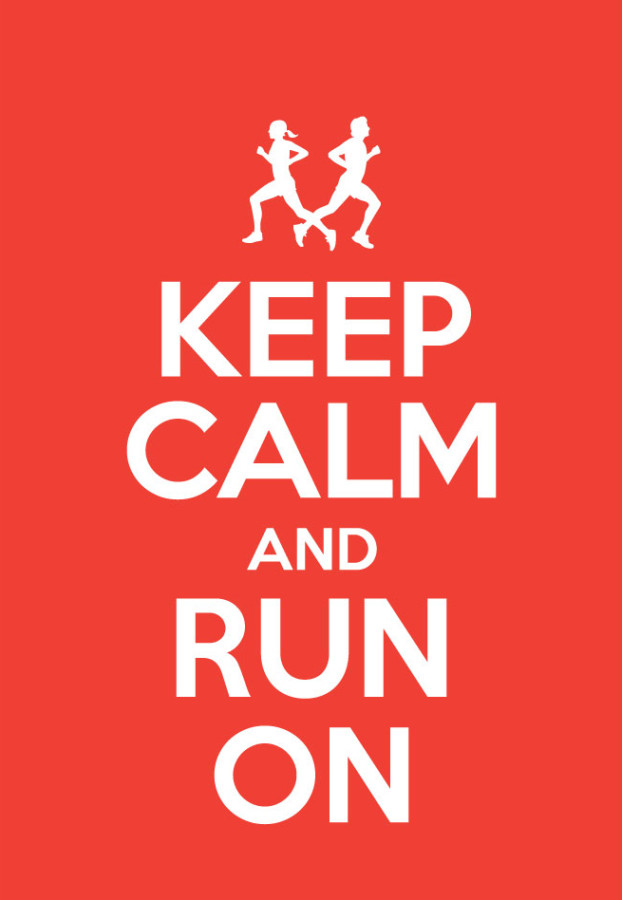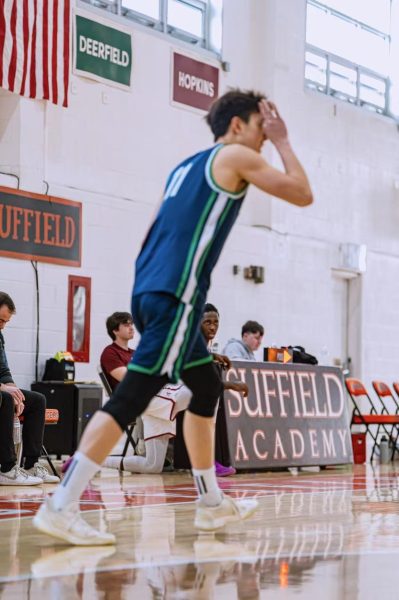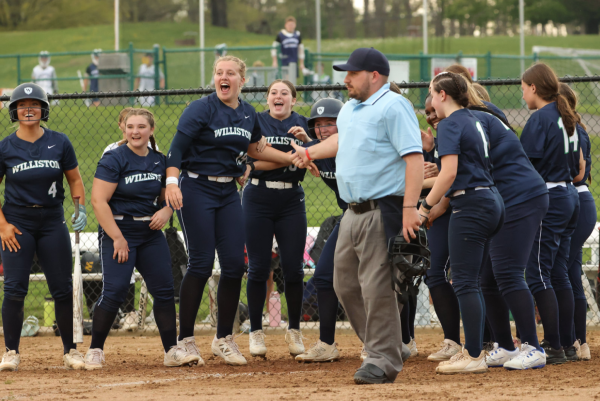Why We Run
It can be argued that running is one of the most difficult activities that a human could do. With nearly 20 million Americans finishing at least one race in 2013, there is obviously an appeal to this grueling sport. And while running on a team is a big motivator for many, running on your own is much more difficult.
Hope Phelan, an Art Teacher at the Bernardston Elementary School in Bernardston, MA is an avid runner and has competed in multiple marathons and half- marathons. She ran in college at the Washington University in St. Louis and has since competed in the elite division in marathons, half marathons, and many 5ks and 10ks. Combining her love of both art and running, Phelan started painting pictures of marathons.
Phelan says that she kept running competitively after college because she “needed to keep competing.” She adds, “Finding a way to stay in shape and having a goal” were important to her.
For some, finishing a certain race is a goal. But for others, finishing a certain race in a certain time is what they train for. In the last decade or so, women’s participation in running races has increased as compared to the participation of men. In the 1990’s, the number of men far outweighed the number of women. By 2010 participation was about equal, but in 2013 there was a notable increase in women’s participation over that of men’s.
Adharanand Finn, author of the “Running Blog” for The Guardian discusses with readers how running is innate and that humans run because it is what we are made for. He writes, “Running brings us joy. Watch small children when they are excited, at play, and mostly they can’t stop running. Back and forth, up and down, in little, pointless circles. I remember, even as an older child, I’d often break into a run when walking along the street, for no reason.”
For many, the social benefits of running is what attracts many to the sport. Phelan says “When I run with others it is nice to have company when you’re doing something you don’t always want to do. “Phelan has experienced firsthand the social benefits of running, since she met her husband through running.
Ashley Fitch ’15 agrees that there are benefits to running. She notes, “Being a part of and captaining the girls Cross Country and Track and Field teams in 2014/2015 allowed me to meet more people and create friendships I did not previously have.”
In addition to meeting friends, running also proves to be a way that these friends spend time together. According to Zach Bernstein ‘16, “Exercise is a common theme, doing something active together instead of staying in.” Meeting friends out for a run is a way to get out of the house and hang out with people, all while keeping up with training.
Natalie Aquadro ’17 also appreciates the social life that running has built for her. She says, “If it weren’t for running I wouldn’t have met some of my closest friends. I wouldn’t have met Mr. T, and he’s truly one of the greatest people in my life.”
Aquadro admits that if it were not for the team, she probably would not be a runner. “Over the summer I run for my team’s achievement”. She runs for the achievement of herself, as well, which comes with the competitive personality of a natural athlete.
“Mr.T”, or Gregory Tuleja, the Williston Girls Cross Country coach. Mr. Tuleja recognizes that running is an immensely hard sport, so he tries his best to support and motivate his athletes as much as he can. He says, “I take time to notice the runner’s efforts throughout the year and say how proud I am of them. It is an important job for a coach to do.”
Finding motivation to run can be tough. Fitch ‘15 says, “usually [I] wants to run more, but on days I would rather not, I put on good energizing music and make myself stand up, that usually is enough to get me going.“
While the support from a coach, team, or parents is highly appreciated and valued, much of the motivation to run comes from within. Abbie Foster ’16 says that she runs for “for self- improvement. It is hard at first, but once you get better you gain confidence and the self-improvement is the best part both mentally and physically. You realize what you are capable of.”
Captain of the Williston Boy’s Cross Country team Nate Gordon ’16 finds motivation to run in training to run better than he did previously. “If I have a bad race, then it motivates me to work harder the next week in practice to make sure I am better prepared for the next race.”
Like Aquadro, Gordon also agrees that the team aspect is huge in terms of why they continue to run. Gordon says, “Running for the team and preparing to race are the only motivation I need to keep running.” The Williston Boys cross country team placed 3rd at New Englands this year, its best finished in over five years. This finish was in large part due to the immense preparation the boys put in.
Michelle Lawson, former Williston cross country coach and science teacher at Williston, says, “running makes me happy. It keeps me sane. There is nothing better than an early morning run when no one else is around and I can think most clearly.” While she does not compete anymore, Lawson still runs as much as she can. She adds, “It is amazing and freeing. And, the endorphins are legit.”
Phelan agrees that running alone can be one of life’s greatest blessings. “When I run alone, I have time to reflect.”
With all of the mental and social benefits to running, some do it simply to remain healthy. Some have weight goals, while others just want to get fit. Marc Parent, a writer for Runners World, says, “Choose almost any physical calamity you can think of, and a recent study will indicate that the simple act of running will tip the odds in your favor. As tough as running can be, it is nowhere near as tough as what happens without it.”
Kissairis Munoz, a write from The Greatist, an online editorial, says that “Running for just an hour a week can reduce the risk of heart disease by almost half compared to non-runners.” Additionally, Munoz references how women could decrease their risk of breast cancer just by running regularly. Long-term health benefits like these are often kept in mind when adults decide to take up running, when they previously were not runners.
Aside from these large scale health benefits, some people decide to run just to be fit. Many athletes also run during their off season to get in shape for their main seaso. Lauren Helm ’16 says, “I run to continue to excel my stamina and endurance and also so I don’t look like I didn’t do anything before preseason starts. It really helped me this season for field hockey.”
Helm ran over the summer to prepare for field hockey season. She said that she learned that “Running makes you think about all the things going on but somehow it is relaxing.”
For all the reasons that we run, most important is that it happens. The high you get after a race and the feeling of satisfaction when you meet your goal are unmatched by any other sport. Running is a sport to take with you for life, and for that runners are forever grateful.








